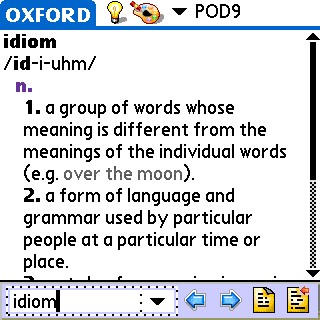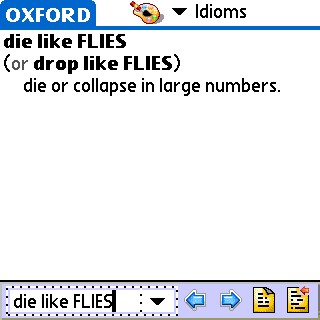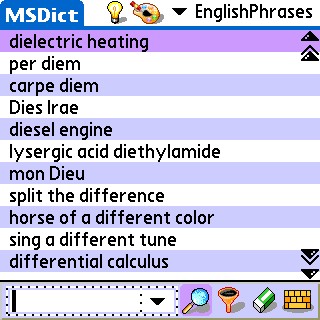
Mobile Systems' Oxford Dictionary of Idioms 4.10
OK, I confess. I'm a word nut. I love language, and words provide the building blocks for human verbal and
written communication. Anyone who translates for a living can tell you that word-by-word translation doesn't always
provide the intended meaning. Sometimes phrases take on a life of their own--more than the sum of the parts--in
any given culture. When I saw the Oxford Dictionary
of Idioms offered for Palm OS, I just had to give it a whirl. So, fasten your seat belts, we're going for
a spin!


This implementation was truly inspired. Each line contains a capitalized key word. MS Dict apparently filters
the searches based on those key words. For instance, in the example provided above, "tur" filters down
on this page to TURKEY, TURN, and TURTLE.

In this case, you can see that the idiom doesn't particularly relate to poultry. Instead, it assumes some Western
cultural knowledge about holiday menus to make a statement about the merit of a particular plan of action. Now
Mobile Systems has provided the Palm OS community
with a cultural translator in their pockets.

The keyword approach carries several advantages over simple word searching in this case. First, it limits the
number of words to be searched to a fraction of the database. Second, when trying to recall a phrase, one most
likely will remember the key word above all else. Also, idioms may vary across regions. In the above example,
I've used the "dropping like flies" version on occasion. Apparently "die like flies" holds
popularity elsewhere, probably in England. The keyword approach brought me to the right place anyway.
Etymological information accompanies most explanations, including the original source if known. I find this important
for two reasons. First, it sheds light on the cultural basis of the idiom. Second, it provides insight into our
culture. One can surmise that the most common idioms originate from sources highly valued by that culture. Shakespeare
and the Bible provide the major sources of idioms used in the Western world. Most entries also contain the time
period and region from which the saying originated, as well as a usage example or two.

A quick note on a similar Mobile Systems offering, the MS
Dict English Phrases Dictionary. The two products have different and complementary content. Rather than idioms,
the Phrases database contains a host of different types of phrases, including some idioms. It even includes some
Latin phrases. The Dictionary of Idioms includes just that--idioms. An idiom is usually a phrase, but a phrase
isn't necessarily or even usually an idiom. I've used the Phrases dictionary for almost a year and have enjoyed
it immensely. I now have and use both, recognizing each's different content and purpose.
Idioms enrich communication in every culture. All of us use and hear idioms virtually every day, yet perhaps don't
understand the nuances in all of them. Ordinary dictionaries rarely do them justice and certainly don't make any
such phrases embedded in definitions easy to find. The Oxford
Dictionary of Idioms puts over 5,000 at our fingertips for a mere $29.95. I've thoroughly enjoyed this product
while preparing for this review, and I'm betting most people will who desire color as well as accuracy in their
reading, listening, writing, and speaking.
Overall Rating: 10/10 (A unique and valuable reference extremely well executed)